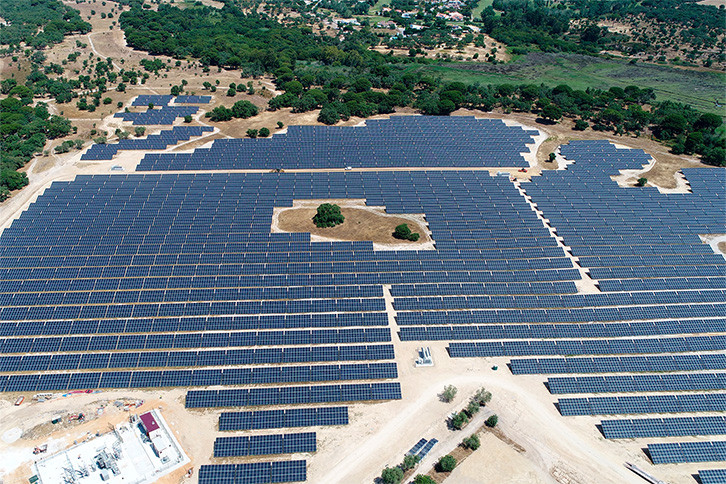News
2022-08-15 18:10:00.0Iberdrola commissions Algeruz II, its first photovoltaic plant in Portugal
- Located in the Setúbal district and with an installed capacity of 27.35 MW, the photovoltaic plant is one of the seven projects awarded to the company in the 2019 auction.
- Algeruz II will produce enough clean energy to supply more than 11,000 households and avoid the emission of 13,400 tonnes of CO2 per year.
Iberdrola continues to make progress with its investment strategy in the Iberian Peninsula, with the commissioning of the Algeruz II photovoltaic plant, the group's first facility of this type in Portugal.
The plant has more than 50,500 fixed, monofacial photovoltaic modules, which will generate enough clean energy to supply more than 11,000 homes and prevent the emission of 13,400 tonnes of CO2 into the atmosphere per year.
The project, which has involved an investment of €17.8 million, has generated more than 200 jobs during peak construction periods, all of them filled by local workers.
Iberdrola was the largest successful bidder in terms of number of lots in the 2019 auction in Portugal with a total of 7 PV projects (7 lots), three of which are under construction and are expected to enter commercial operation during the year. These are the Conde (13.51 MW), Alcochete I (32.89 MW) and Alcochete II (12.72 MW) PV plants, also located in the Setúbal district. The Alcochete I and II projects will have bifacial technology that maximises energy production and reduces the average cost of electricity by 16%.
In addition, the Montechoro I (11.57 MW), Montechoro II (24.95 MW) and Carregado (64.1 MW) projects, awarded in the same auction, are in the process of obtaining the construction licence and are scheduled to be commissioned in 2023, at which time Iberdrola's PV capacity in Portugal will total 187 MW.
Renewable commitment to Portugal
Iberdrola has been leading the energy transition for two decades, acting as a key driving force in the transformation of the industrial fabric and the green recovery of the economy and employment. To this end, the company has launched a historic investment plan of 150 billion euros over the next decade - 75 billion euros by 2025 - with which to triple renewable capacity, double network assets and commit to clean and sustainable consumption.
In the current context, accelerating the energy transition is essential to reduce dependence on fossil fuels and combat the effects of climate change.
In Portugal, Iberdrola serves a large commercial portfolio of customers, has 92 MW of wind power in operation and has commissioned the Daivões (conventional plant) and Gouvães (pumped-storage plant) hydroelectric plants, which are part of the Támega River gigabattery - one of the largest energy storage facilities in Europe with 1,158 MW of capacity - and which has required an investment of more than 1.5 billion euros.
In addition to this, a large wind farm with a planned total capacity of 400 MW will be built in the future, linked to the gigabattery, which will turn the complex into a hybrid generation plant.
This will allow users to consume wind energy during periods of peak demand and use the surplus to power the pumping system, helping to improve the efficiency of the system and guarantee electricity supply. Iberdrola will thus be able to manage supply and demand with hydroelectric and wind technologies, depending







